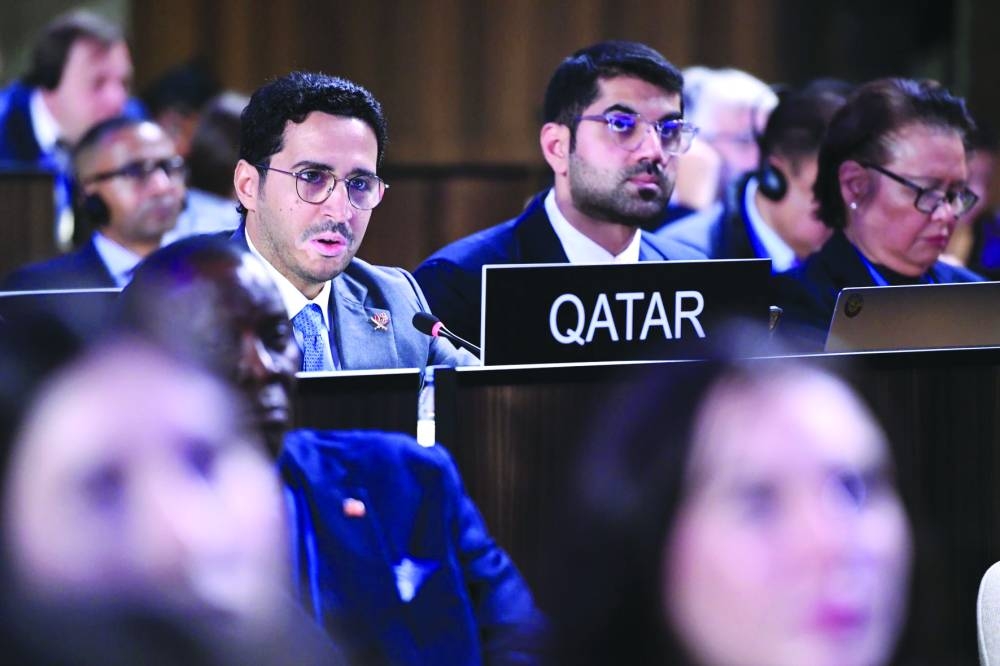Qatar has called on member states of the UN Educational, Scientific and Cultural Organisation (Unesco) to join efforts within the framework of Unesco’s action plan for the Executive Board’s decision to protect education from attack, and to protect this basic right as there is no safe future without education.
This came in a speech Tuesday by HE the Permanent Representative of Qatar to Unesco Dr Nasser bin Hamad al-Hanzab before the General Session of the Unesco’s Executive Board, which continues until October 23.
He said that the world is witnessing the largest humanitarian disaster in the Gaza Strip, as the Israeli aggression has claimed the lives of more than 41,000 people with this number increasing, including 17,000 children and 11,000 women, in addition to the complete destruction of schools and universities, heritage sites and museums, and the death of 177 journalists.
HE Dr al-Hanzab also noted the expansion of the Israeli aggression on Lebanon.
The international community, he said, has failed to put an end to these blatant violations of humanity, as the aggression on Lebanon has caused the displacement of children and deprived them of their right to education.
HE Dr al-Hanzab stressed that Qatar continues to work together with all member states and Unesco in its various sectors, and to exert more efforts to achieve the noble goals of the organisation, especially achieving the goals of the Unesco’s 2026-2029 strategy in light of the critical circumstances witnessed by the entire world, while stressing the need to enhance the principle of transparency and wise management in implementing Unesco’s strategy.
He highlighted Qatar’s efforts in the context of protecting the right to education, as international partners from international organisations, countries and civil society institutions met in Doha in an event held under the title Education in Peril: The Human Cost of War, on the occasion of the International Day to Protect Education From Attack last month, during which the effects of wars on children were discussed.
HE Dr al-Hanzab also noted Qatar’s efforts through signing a memorandum of understanding with Canada in the field of development co-operation, and another framework agreement for international co-operation in the field of education and development with a total value of $95mn to enhance youth employment and empowerment.
Education Above All Foundation pledged to provide $40mn for various initiatives, with the aim of reaching youth and children through education and employment, while empowering youth, enhancing their skills and providing job opportunities to develop human and economic development in societies.
In June Qatar launched the Debt Relief for Education initiative in co-operation with the World Bank and Education Above All to address the challenges posed by sovereign debt and explore appropriate methods and frameworks to address issues arising from debt, he added, noting that Qatar, at the national level, launched its National Education Strategy 2024-2030 in line with achieving the goals of the human development pillar of the National Vision 2030, which contributes to identifying opportunities and overcoming challenges in the coming years through innovation and excellence in education, enhancing teachers skills and developing them professionally, and preparing a generation capable of facing the challenges of the future.
HE Dr al-Hanzab stressed that Qatar has adopted an effective national policy to ensure that cultural dialogue is the cornerstone of the country’s policy and its relationship with the world as a whole, and to encourage the adoption of a forward-looking approach that addresses the challenges of human development and the aspirations of future generations by promoting interfaith dialogue and the alliance of civilisations, both of which are of utmost importance in today’s world, which is witnessing the growth of fanaticism and extremism, in an effort to build bridges with other countries and cultures and enhance global co-operation and understanding.
He reiterated that Qatar will continue its vital role in the international arena to support peace and stability and contribute to the peaceful settlement of conflicts and disputes by enhancing the educational process, strengthening international co-operation and solidarity in multilateral efforts and enhancing co-operation and dialogue to confront global challenges.

